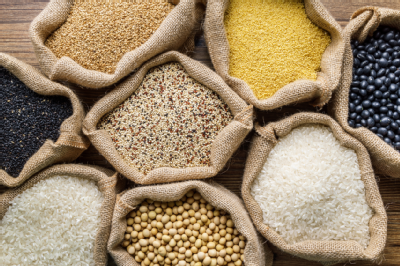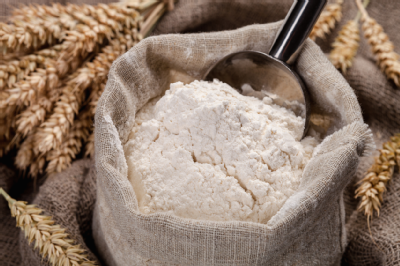Grains
- People with coeliac disease can safely eat many common plants, seeds, grains, cereals and flour, including corn, polenta, potatoes, rice and soya.
- However they should avoid barley, wheat, rye, couscous and semolina as they contain gluten.
- Download our handy Guide to gluten free grains to find out more.
If you have coeliac disease, you need to be gluten free which means that you can’t eat gluten.
Gluten is a protein found in the cereals wheat, barley and rye.
 Cereals are the edible seeds or grains of the grass family and including them in our diet gives us:
Cereals are the edible seeds or grains of the grass family and including them in our diet gives us:
- carbohydrates – a source of energy
- fibre – which slows digestion and absorption of nutrients from the gut and helps prevent constipation
- most B vitamins, especially thiamin, riboflavin and niacin – needed for a number of processes in the body including helping the body get energy from food and to maintain healthy skin and vision.
A ‘pseudocereal’ is a plant which is not a grass or cereal but can be used in similar ways. Naturally gluten free pseudocereals include amaranth, buckwheat and quinoa.
Here's a guide to common plants, seeds, grains, cereals and flours.
You can also download a fact sheet on this at the bottom of this page.
Not gluten free
- Barley (including products that contain malted barley such as malted drinks, beers, ales, lagers and stouts)
- Bulgar wheat
- Couscous
- Durum wheat
- Einkorn
- Emmer (also known as faro)
- Khorasan wheat (commercially known as Kamut®)
- Pearl barley
- Rye
- Semolina
- Spelt
- Triticale
- Wheat.
Need to check
- Barley malt extract (some breakfast cereals containing barley malt extract are suitable if they are labelled gluten free)
- Oats.
Gluten free
- Agar
- Almond
- Amaranth
- Buckwheat
- Carageenan
- Cassava (manioc)
- Chestnut
- Corn
- Flax/linseed
- Fonio
- Gram flour (besan)
- Hemp
- Hops
- Maize
- Millet/bajra
- Mustard
- Polenta
- Potato
- Pulses (peas, beans, lentils)
- Quinoa
- Rice
- Sago
- Sesame
- Sorghum
- Soya
- Tapioca
- Teff
- Urd/urid/urad flour.
Cross contamination
 Although some flours are naturally gluten free, they can be milled where wheat flour is also milled. See our Food and Drink Information for suitable products for your diet and always look for flours labelled gluten free.
Although some flours are naturally gluten free, they can be milled where wheat flour is also milled. See our Food and Drink Information for suitable products for your diet and always look for flours labelled gluten free.
Cross contamination can happen because wheat flour is in the atmosphere or traces of it remain in storage containers. It’s possible that flours made from pulses, such as gram flour and urad flour, may be contaminated although they are naturally gluten free.
Find out more about reading food labels which may help in deciding whether products are safe for you.
Oats can be eaten by most people with coeliac disease but only if they're marked as 'gluten free'. Uncontaminated gluten free oat products are listed in the 'Oats' chapter of our Food and Drink Guide.